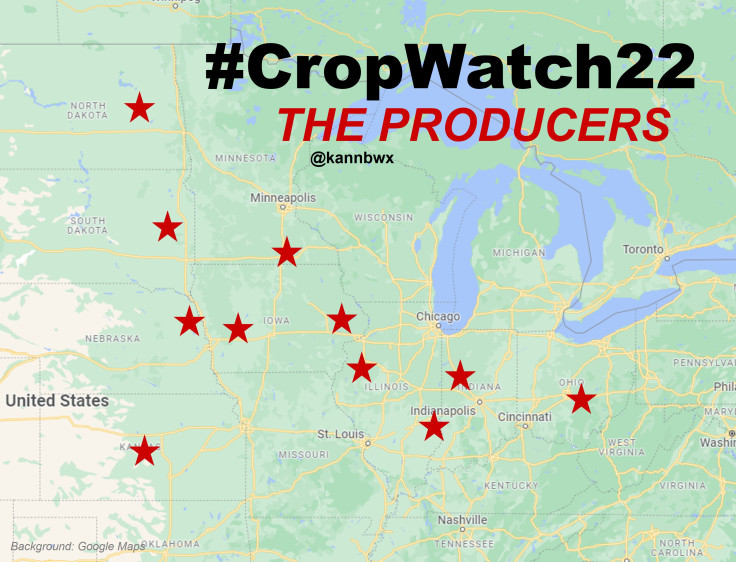Column - Crop Watch: Western Fields Dinged By Dryness; East Fares Better - Braun
Crop Watch producers in the western U.S. Corn Belt trimmed crop ratings across the board after a hot and mostly dry week last week, though recent rains have bolstered prospects in the east.
Western areas are likely to face another hot and dry stretch this week, but cooler temperatures and rain chances in the east should prevent stress on those crops into mid-month.
The 11 Crop Watch producers have been reporting weekly on their yield potential and crop conditions. Both are scored on a 1-to-5 scale, with 3 representing average conditions and yield expectations, and 5 excellent health or near-record yields expected.
The 11-field average condition scores are slightly higher than the yield scores, suggesting there may be a slight bias for the crops to look better from the road than in reality. Condition and yield averages for both crops are very similar to year-ago ones.
Average corn condition fell to 4.0 from 4.07 last week on a large cut in North Dakota and smaller ones in South Dakota and western Iowa. Increases in Indiana and southeastern Illinois offset some of that.
The unweighted, 11-field average corn yield dropped to 3.93 from 3.98 last week on trims in the Dakotas, Nebraska and western Iowa, outweighing small boosts in Minnesota and southeastern Illinois.
The soybean scores rose slightly from last week, anchored by larger increases in Minnesota. Soy conditions rose to 3.89 from 3.84 and included improvements in both Illinois locations but declines in Nebraska, Kansas and western Iowa.
Soybean yield rose to 3.73 from 3.68 last week, the highest score since yield ratings started earlier in July. Better scores in Minnesota and southeastern Illinois offset shrinkage in Nebraska and Kansas.
WEATHER SUMMARY
About 1 inch (25 mm) of rain has fallen over the last six weeks in the North Dakota location, and corn plants are showing stress following what appears to have been successful pollination. More concerning is the complete lack of pods on the soybean plants thus far.
The South Dakota fields picked up 1.2 inches for the week and Minnesota added 1.9 inches, though the July dry stretch may have already clipped yield potential in South Dakota. Less than 2.5 inches of rain over the last seven weeks coupled with warmer temperatures have lowered hopes in Nebraska.
The Kansas crops have also suffered a hot and dry stretch, though soybeans and sorghum could still be helped by rains, which are not in the forecast. Short season corn harvest may begin next week for the Kansas producer, about 20 days early.
Crop Watch fields in western Iowa had been in excellent shape most of the summer, but more than three weeks with minimal moisture have taken a toll there. Some of the damage in corn is likely irreversible, but the fields received a "crop-saving" 0.75 inch of rain overnight into Monday.
The eastern Iowa and Illinois fields remain in excellent position for high yields, though the eastern Iowa producer notes that recently high humidity could introduce disease in the beans. Southeastern Illinois has been among the most consistent for rainfall this summer among Crop Watch locations.
The Indiana fields limped through another week with just 0.6 inch of rain over the last seven days, enough to maintain average yield hopes. Between 1 and 2 inches fell in the Ohio fields last week, and more rain could arrive mid-week.
The following are the states and counties of the 2022 Crop Watch corn and soybean fields: Griggs, North Dakota; Kingsbury, South Dakota; Freeborn, Minnesota; Burt, Nebraska; Rice, Kansas; Audubon, Iowa; Cedar, Iowa; Warren, Illinois; Crawford, Illinois; Tippecanoe, Indiana; Fairfield, Ohio.
Photos of the Crop Watch fields can be tracked on my Twitter feed using handle @kannbwx.
Graphic: Crop Watch Producers 2022 (

)
Karen Braun is a market analyst for Reuters. Views expressed above are her own.
(Editing by Matthew Lewis)
© Copyright Thomson Reuters 2024. All rights reserved.







